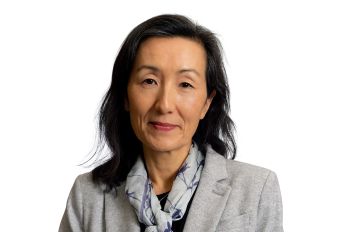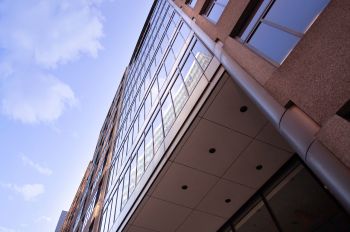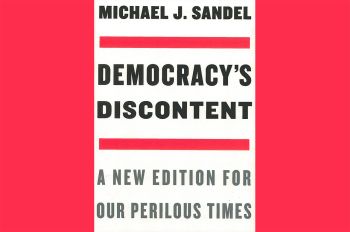Seven Chicago-Kent Students Selected for 2019 Institute for the Future of Law Practice Program
Seven Chicago-Kent College of Law students were selected for the 2019 Institute for the Future of Law Practice (IFLP) program, which is the most students of any participating United States law school.
IFLP is a nonprofit organization dedicated to providing entrepreneurial and technology-based skills training to law students and mid-career professionals. Students selected for the program attend a multi-week, intensive bootcamp, followed by a paid 10-week or seven-month internship with a law firm, legal services provider, legal tech company, public service organization, or innovative in-house legal department.
The seven Chicago-Kent students in this year’s program are Trace Bareck ‘20, Anna Corbett ‘20, Mara Flack ‘20, Yilun Hu ‘20, Marisa McGrenera ‘21, McKay Mitchell ‘21, and Kristin Riffner ‘21.
IFLP bootcamps complement traditional law school curriculum with training in design thinking, data analytics, technology, and process and project management. Among the skills participants are learning include business techniques for process improvement such as Lean Six Sigma and knowledge management, as well as tech data visualization, computational thinking, and artificial intelligence skills. Students are also tasked with developing innovative solutions to hypothetical business challenges, such as developing a system to streamline and automate the non-disclosure agreement process for a large company. Bootcamp teams get an opportunity to pitch their ideas to a “Shark Tank”-style panel comprised of in-house, legal aid, and law firm attorneys.
Four of the seven Chicago-Kent students participating in the IFLP program are also part of the law school’s Law Lab, an interdisciplinary teaching and research center focused on legal innovation and technology. The Law Lab’s courses offer a unique blend of law, technology, finance, science and design methodologies that show students how to apply technology and quantitative analysis to the delivery of legal services. Students learn about the economic factors affecting the legal industry and get to experiment and develop innovative new business solutions.
The Law Lab’s courses are part of the law school’s Legal Innovation and Technology certificate program. Alex Rabanal, associate director of the Law Lab, says the opportunity to optimize legal services and turn services into products are proliferating with technology and that the interdisciplinary skills required for innovation are more highly valued than ever before. The skills that students gain in the Law Lab and IFLP bootcamp should no longer be viewed as supplementary to traditional law school curriculum, he said, but rather critical for students’ professional development.
“I’m definitely proud of our students,” Rabanal says. “I’m confident that the initiative they’ve shown in participating in a rigorous program like IFLP will carry over into their professional experiences, both through IFLP and beyond.”
The following are brief profiles of the seven participating students:
Trace Bareck ’20 has always had a passion for emerging technologies and enjoys the collaborative, interdisciplinary nature of legal tech innovation. Last summer, he did an internship with Fulcrum GT and was the product manager on a team that developed an education app called Jolt. Bareck says it was great to see developers bring the idea to life, and it gave him a glimpse into how a law degree can help play a role in product design. He is a Law Lab Legal Innovation and Technology certificate program student, and his internship this summer is with HBR Consulting. Upon graduation, Bareck hopes to use his legal tech skills to work for a law firm or a consulting group. “Law firms as a whole are slowly coming around to new innovations to create efficiencies and cut costs,” he says. “All of this will help in increasing access to justice.”
Anna Corbett ’20 says the IFLP program is the perfect marriage between her career experience and professional goals. Prior to law school, Corbett worked as a paralegal interpreter for an immigration practice focused on defending families, and at a family law practice for low-income individuals. She has also worked as a project manager in the language access industry, which included systems integration building, project management, and audio engineering. Corbett is president of the Art and Cultural Property Law Society and the vice president of administration for the law school’s American Constitution Society chapter. She is also a shift manager for the Self-Help Web Center at the Daley Center, which helps self-represented litigants access online tools and legal resources available through the web. Corbett also received an award this spring from Public Interest Law Initiative for her volunteer work. Through IFLP, Corbett will have a seven-month internship with Perkins Coie LLP in the firm’s Portland, Oregon and Chicago offices. “I’ve eagerly sought exposure to legal technology solutions and their real-world deployment,” she says. “The placement with Perkins Coie offers a chance to get this experience from outstanding leaders in a complex environment –- and I get to do it in my hometown!”
Mara Flack ’20 believes technology integration is an important part of the future of law, and she is excited to apply a problem-solving approach to legal work. An interdisciplinary model of learning connects well with her undergraduate studies, which included anthropology, Hispanic studies, and Latin American and Latino studies. Flack is the treasurer and external liaison of the Decalogue Society and was vice president of the Corporate Law Society during her 2L year. She is a student in the Law Lab Legal Innovation and Technology certificate program and will be doing a seven-month internship with Katten Muchin Rosenman LLP. “I am looking forward to interacting with the firm’s different practice areas to see the similarities and differences to how they employ technological innovation to long-standing fields of law,” she said.
Yilun Hu ’20 is passionate about legal innovation and is a Law Lab Legal Innovation and Technology certificate student. During his 2L spring semester, he worked with HBR Consulting on legal tech projects. Hu is part of the Honors Scholars Program, president of Chicago-Kent’s China Law Society and was part of the Chicago-Kent Law Review last year. He externed for the U.S. District Court for the Northern District of Illinois following his first year of law school. Following IFLP bootcamp, Hu will have a seven-month internship with Baker McKenzie. “Baker McKenzie has shown a tremendous interest and commitment in this space by building out the innovation team,” he says. “I look forward to learning the vision, strategy, and operations of a successful legal innovation team.”
Marisa McGrenera ‘21 was drawn to the IFLP program’s interdisciplinary approach to blending technology, innovation, and data science to law practice. “Since I have a background in research, I was eager to learn how my analytic skills could be utilized in my legal career,” she says. McGrenera is a member of the Moot Court Honor Society, as well as the Cyber-Security and Data Privacy Society, the Disability Advocacy Law Student Association, the Women in Law Society, and serves as the fundraising chair of the Student Humanitarian Network. McGrenera is pursuing a joint juris doctor and master’s in public health degree at Chicago-Kent and University of Illinois at Chicago and hopes to someday work in healthcare and public policy as an attorney to improve healthcare compliance. McGrenera will be an intern at Levenfeld Pearlstein LLC this summer.
McKay Mitchell ’21 says he sees combining legal innovation and technology as a great non-traditional career path for entrepreneurial-minded lawyers. Prior to law school, he led a team in designing and conducting an evaluation of clean water projects for a nonprofit organization that included providing data-driven suggestions on how to improve processes, efficiency, and sustainability. Mitchell has been on the dean’s list, is a member of the Moot Court Honors Society, and is a 2019 Latham & Watkins Technology Innovation Summit scholar. A student in the Law Lab’s Legal Innovation and Technology certificate program, he will be interning with Seyfarth Shaw LLP’s SeyfarthLean Consulting group. Mitchell said he is excited to work for a law firm that is recognized as a leader in legal innovation. “It is a great opportunity to learn from experienced professionals and see the added value they are able to deliver to their clients through their use of technology and improved processes,” he says.
Kristin Riffner ’21 says that effectively utilizing technology within the law is what makes a truly effective twenty-first century lawyer. Prior to law school, Riffner was a program manager for University of Chicago Medicine and saw firsthand the importance of integrating technology into business processes. She helped change the onboarding process for the Volunteer Services department at UChicago Medicine from paper-based to a completely online system, which streamlined the entire process for the thousands of applications that the department handles annually. Riffner is also a volunteer with the Self-Help Web Center at the Daley Center, which helps self-represented litigants access online tools and legal resources available through the web. A member of the Honors Scholars Program, she aspires to practice corporate law, either in a law firm or in-house setting, and hopes to become a tech innovation leader in the legal industry. This summer, she will be an intern with the in-house legal department at Alliant Credit Union. “I’m looking forward to gaining my first bit of exposure to an in-house legal department and being able to contribute using the things I've learned during the IFLP boot camp,” she says.



